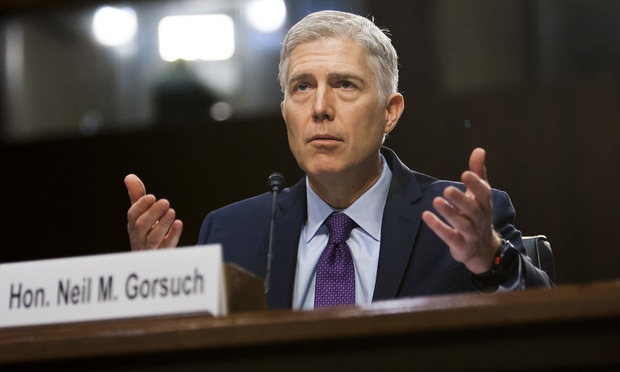Kagan, Gorsuch Show Divide Over Rigged Electoral Maps
"What's the scope of the problem here?" Gorsuch asked at one point. Kagan said the court can't leave redistricting "all to professional politicians."
March 26, 2019 at 03:26 PM
5 minute read
 Neil Gorsuch testifies at his confirmation hearing in 2017. Credit: Diego M. Radzinschi/ ALM
Neil Gorsuch testifies at his confirmation hearing in 2017. Credit: Diego M. Radzinschi/ ALM
The U.S. Supreme Court on Tuesday appeared just as divided as it did a year ago over how to rein in excessive partisanship in redistricting, and nowhere was that more clear than in how Justices Neil Gorsuch and Elena Kagan reacted to each others' comments.
In Rucho v. Common Cause, North Carolina's Republican-controlled General Assembly intentionally drew district lines to preserve its 10-3 dominance of the state's congressional delegation even though Republicans captured just 53 percent of the statewide vote in 2016. A three-judge district court said the map was an impermissible partisan gerrymander.
But as the justices struggled during oral arguments with various tests for rooting out excessive partisanship, Gorsuch suggested that states themselves, through independent redistricting commissions, may be on the way to solving the problem.
“One of the arguments that we've heard is that the court must act because nobody else can as a practical matter,” Gorsuch told Kirkland & Ellis partner Paul Clement, counsel to the General Assembly. “I just happen to know my home state of Colorado this last November had such a referendum on the ballot that passed overwhelmingly, as I recall.”
Gorsuch continued: “I believe there are others and I'm just wondering, what's the scope of the problem here? I also know there are five states with only a single representative, right, in Congress, so presumably this isn't a problem there.”
Gorsuch said he sensed “a lot of movement” in the states in this area. Clement quickly agreed, saying, “That's exactly right.” And, he added, Congress also could act. The first bill, H.R. 1. on the agenda of the new Congress, noted Clement, contains a provision to “essentially force states to have bipartisan commissions,” although that may be unconstitutional.
Kagan quickly jumped on Clement's argument that the only constitutionally prescribed way of dealing with redistricting is in the hands of state legislatures, and she tied it into Gorsuch's comments.
“Going down that road would suggest that Justice Gorsuch's attempt to sort of say 'This is not so bad because the people can fix it,' is not so true because you're suggesting that the people really maybe can't fix it,” she said. “So Justice Gorsuch's attempts to save what's so dramatically wrong here, which is the court leaving this all to professional politicians who have an interest in districting according to their own partisan interests, seems to fail.”
In questioning the challengers to the North Carolina plan, Gorsuch also seemed to suggest that they would not be satisfied unless the court required proportional representation, which the court has said the Constitution does not require.
But Kagan didn't see the challengers' arguments that way. “The benchmark is not proportional representation,” she said. “The benchmark is the natural political geography of the state, plus all the districting criteria, except for partisanship.”
The challengers offered more than 24,000 potential redistricting maps for North Carolina, she added, and 99 percent showed that the 10-3 configuration was not the natural one. “It's just not the way anyone can district given the actual political geography on the ground, unless you absolutely try to overrule that political geography,” she said.
 Justice Stephen Breyer testifies in 2015. Photo by Diego M. Radzinschi/THE NATIONAL LAW JOURNAL
Justice Stephen Breyer testifies in 2015. Photo by Diego M. Radzinschi/THE NATIONAL LAW JOURNALJustice Stephen Breyer suggested a way to catch the extreme partisan gerrymanders, a baseline approach, but one that failed to get much traction.
If there is no independent commission, he said, and one party controls the legislature, a gerrymander is unconstitutional if the other party wins a majority of votes in the state, but the party in control gets more than two-thirds of the congressional seats.
In the North Carolina case as well as a second case involving a partisan gerrymander challenge to Maryland's 6th Congressional District, the challengers offered the high court a number of different tests for weighing partisanship, for example, a three-prong test examining intent, effects and durability of those effects.
In the end, the justices appeared divided along ideological lines in both cases on whether there is a manageable test for determining excessive partisanship and whether the court should be involved at all.
Emmet Bondurant of Atlanta's Bondurant Mixson & Elmore argued for the challengers to the North Carolina plan and he shared argument time with Allison Riggs of the Southern Coalition for Social Justice. In the Maryland case—Lamone v. Benisek—Maryland Solicitor General Steven Sullivan represented the state; Mayer Brown partner Michael Kimberly was counsel for the challengers.
Read more:
Sen. Whitehouse: There's a 'Crisis of Credibility' at the U.S. Supreme Court
SCOTUS Takes Up 2 Partisan Gerrymandering Cases
Justices Skirt Conclusive Ruling on Partisan Gerrymandering
This content has been archived. It is available through our partners, LexisNexis® and Bloomberg Law.
To view this content, please continue to their sites.
Not a Lexis Subscriber?
Subscribe Now
Not a Bloomberg Law Subscriber?
Subscribe Now
NOT FOR REPRINT
© 2025 ALM Global, LLC, All Rights Reserved. Request academic re-use from www.copyright.com. All other uses, submit a request to [email protected]. For more information visit Asset & Logo Licensing.
You Might Like
View All

DC Circuit Revives Firefighters' Religious Freedom Litigation in Facial Hair Policy Row
3 minute read
Federal Judge Pauses Trump Funding Freeze as Democratic AGs Plan Suit
4 minute read
4th Circuit Upholds Virginia Law Restricting Online Court Records Access
3 minute readTrending Stories
- 1AIAs: A Look At the Future of AI-Related Contracts
- 2Litigators of the Week: A $630M Antitrust Settlement for Automotive Software Vendors—$140M More Than Alleged Overcharges
- 3Litigator of the Week Runners-Up and Shout-Outs
- 4Linklaters Hires Four Partners From Patterson Belknap
- 5Law Firms Expand Scope of Immigration Expertise, Amid Blitz of Trump Orders
Who Got The Work
J. Brugh Lower of Gibbons has entered an appearance for industrial equipment supplier Devco Corporation in a pending trademark infringement lawsuit. The suit, accusing the defendant of selling knock-off Graco products, was filed Dec. 18 in New Jersey District Court by Rivkin Radler on behalf of Graco Inc. and Graco Minnesota. The case, assigned to U.S. District Judge Zahid N. Quraishi, is 3:24-cv-11294, Graco Inc. et al v. Devco Corporation.
Who Got The Work
Rebecca Maller-Stein and Kent A. Yalowitz of Arnold & Porter Kaye Scholer have entered their appearances for Hanaco Venture Capital and its executives, Lior Prosor and David Frankel, in a pending securities lawsuit. The action, filed on Dec. 24 in New York Southern District Court by Zell, Aron & Co. on behalf of Goldeneye Advisors, accuses the defendants of negligently and fraudulently managing the plaintiff's $1 million investment. The case, assigned to U.S. District Judge Vernon S. Broderick, is 1:24-cv-09918, Goldeneye Advisors, LLC v. Hanaco Venture Capital, Ltd. et al.
Who Got The Work
Attorneys from A&O Shearman has stepped in as defense counsel for Toronto-Dominion Bank and other defendants in a pending securities class action. The suit, filed Dec. 11 in New York Southern District Court by Bleichmar Fonti & Auld, accuses the defendants of concealing the bank's 'pervasive' deficiencies in regards to its compliance with the Bank Secrecy Act and the quality of its anti-money laundering controls. The case, assigned to U.S. District Judge Arun Subramanian, is 1:24-cv-09445, Gonzalez v. The Toronto-Dominion Bank et al.
Who Got The Work
Crown Castle International, a Pennsylvania company providing shared communications infrastructure, has turned to Luke D. Wolf of Gordon Rees Scully Mansukhani to fend off a pending breach-of-contract lawsuit. The court action, filed Nov. 25 in Michigan Eastern District Court by Hooper Hathaway PC on behalf of The Town Residences LLC, accuses Crown Castle of failing to transfer approximately $30,000 in utility payments from T-Mobile in breach of a roof-top lease and assignment agreement. The case, assigned to U.S. District Judge Susan K. Declercq, is 2:24-cv-13131, The Town Residences LLC v. T-Mobile US, Inc. et al.
Who Got The Work
Wilfred P. Coronato and Daniel M. Schwartz of McCarter & English have stepped in as defense counsel to Electrolux Home Products Inc. in a pending product liability lawsuit. The court action, filed Nov. 26 in New York Eastern District Court by Poulos Lopiccolo PC and Nagel Rice LLP on behalf of David Stern, alleges that the defendant's refrigerators’ drawers and shelving repeatedly break and fall apart within months after purchase. The case, assigned to U.S. District Judge Joan M. Azrack, is 2:24-cv-08204, Stern v. Electrolux Home Products, Inc.
Featured Firms
Law Offices of Gary Martin Hays & Associates, P.C.
(470) 294-1674
Law Offices of Mark E. Salomone
(857) 444-6468
Smith & Hassler
(713) 739-1250








